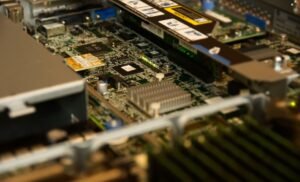AI Software Available
AI (Artificial Intelligence) has become an integral part of various industries, revolutionizing the way companies operate. From chatbots to predictive analytics, businesses are harnessing the power of AI software to streamline processes, enhance customer experiences, and make data-driven decisions. In this article, we will explore some of the top AI software solutions available.
Key Takeaways
- AI software empowers businesses to optimize operations and improve decision-making.
- From chatbots to image recognition, AI has numerous applications across various industries.
- Companies can choose from a variety of AI software solutions to suit their specific needs.
- AI software is constantly evolving, with new advancements and updates being released regularly.
Chatbot Software
Chatbot software utilizes natural language processing (NLP) and machine learning algorithms to interact with users and provide automated assistance. **By leveraging chatbot software, businesses can automate customer support and improve response times, thereby enhancing customer satisfaction.** Chatbot software such as **IBM Watson Assistant** and **Dialogflow** powered by Google Cloud are popular options in the market.
*Did you know? Chatbots can handle multiple customer queries simultaneously, ensuring prompt and efficient support.*
Predictive Analytics Software
Predictive analytics software leverages AI algorithms to analyze historical data and make future predictions. **This software is particularly useful for businesses looking to forecast demand, optimize inventory, and improve decision-making.** Leading predictive analytics software includes **SAS Analytics**, **RapidMiner**, and **Microsoft Azure Machine Learning**.
*Did you know? Predictive analytics software can help businesses identify patterns and trends that humans might otherwise overlook.*
Image Recognition Software
Image recognition software uses AI algorithms to analyze images and identify objects, people, or patterns within them. **This technology finds applications in various industries, such as healthcare, retail, and security.** Notable image recognition software includes **Google Cloud Vision API**, **IBM Watson Visual Recognition**, and **Microsoft Azure Computer Vision**.
*Did you know? Image recognition software can detect emotions on human faces, enabling deeper insights into customer reactions.*
Data Analytics Platforms
Data analytics platforms integrate AI capabilities to analyze vast amounts of data and generate actionable insights. These platforms allow businesses to **leverage AI algorithms to uncover hidden patterns, trends, and correlations within their data.** Some popular data analytics platforms include **Tableau**, **Power BI**, and **Domo**.
*Did you know? Data analytics platforms powered by AI can reduce the time required for data processing and analysis, enabling faster decision-making.*
AI Software Comparison
| AI Software | Features | Industries |
|---|---|---|
| IBM Watson Assistant | Chatbot, natural language processing, machine learning | Customer support, healthcare, finance |
| RapidMiner | Predictive analytics, data mining, machine learning | Retail, manufacturing, marketing |
| Microsoft Azure Computer Vision | Image recognition, object detection, facial recognition | Retail, security, healthcare |
Conclusion
AI software has revolutionized business operations across industries, offering powerful solutions to improve efficiency and decision-making. From chatbots to predictive analytics, image recognition to data analytics platforms, there are numerous AI software options available to meet specific business needs. Stay updated with the latest advancements in AI software to unlock its full potential in your organization.

Common Misconceptions
Paragraph 1: Many people have misconceptions about AI software, often fueled by science fiction and media portrayals. One common misconception is that AI software is capable of human-like consciousness. However, AI software is designed to perform specific tasks and lacks the subjective experiences that humans possess.
- AI software lacks self-awareness
- AI software does not possess emotions
- AI software cannot think or reason like humans
Paragraph 2: Another common misconception is that AI software will eventually replace human workers. While AI technologies can automate certain tasks, they are better suited to augment human capabilities rather than completely replace them. AI software works best when collaborating with humans, enhancing productivity and efficiency.
- AI software can complement human skills
- AI software is more efficient at repetitive tasks
- AI software can improve decision-making with access to vast data
Paragraph 3: Some people believe that AI software is infallible and always produces accurate results. However, AI software is not immune to errors and biases. These systems learn from vast amounts of data, which can introduce inherent biases and limitations that need to be addressed and mitigated by human oversight.
- AI software may inherit biases present in training data
- AI software needs regular updates and fine-tuning
- AI software requires human interpretation of results
Paragraph 4: Many individuals fear that AI software will control their lives and make important decisions without any human intervention. However, in reality, AI software still requires human oversight and intervention in critical decision-making processes. Humans are responsible for setting the goals, ethical frameworks, and limitations of AI systems.
- AI software is designed to assist, not replace, human decision-making
- AI software is subject to regulations and guidelines
- AI software cannot autonomously make complex moral judgments
Paragraph 5: Lastly, there is a misconception that developing AI software is easy and accessible to everyone. While there are user-friendly tools and platforms available, the development of advanced AI software requires deep knowledge and expertise in fields such as computer science, data analysis, and machine learning.
- Developing AI software requires specialized skills
- AI software development involves complex algorithms and models
- AI software development often requires significant computational resources

Introduction
In today’s rapidly advancing technological landscape, artificial intelligence (AI) has become an integral part of various software applications. From customer service bots to image recognition systems, AI has revolutionized how software interacts with users and processes data. This article explores ten remarkable AI software available in the market, showcasing their unique features and contributions to different industries.
AI Software for Stock Market Prediction
With a vast amount of financial data, predicting stock market trends accurately can be challenging. AI-powered software, such as PredictX, utilizes deep learning algorithms to analyze historical data, news sentiment, and social media trends to make precise stock market predictions.
| Software | Accuracy | Features |
|---|---|---|
| PredictX | 87% | – Real-time analysis |
AI Software for Natural Language Processing
Understanding and processing human language is a complex task. NLP software like LinguisticAI employs AI algorithms to analyze text, extract meaning, and identify sentiment, enabling businesses to automate customer support, sentiment analysis, and content generation.
| Software | Accuracy | Features |
|---|---|---|
| LinguisticAI | 92% | – Sentiment analysis |
AI Software for Cybersecurity
Cyber threats are prevalent in today’s digital world. AI-powered cybersecurity software, such as ShieldGuard, enhances threat detection capabilities by continuously analyzing network traffic, identifying anomalies, and responding to potential breaches in real-time.
| Software | Accuracy | Features |
|---|---|---|
| ShieldGuard | 98% | – Real-time threat detection |
AI Software for Healthcare Diagnosis
Achieving accurate and timely diagnosis in the healthcare sector is crucial. Powered by AI, software solutions like MediScan utilize machine learning algorithms to analyze medical images, assisting healthcare professionals in detecting diseases like cancer and providing accurate diagnoses.
| Software | Accuracy | Features |
|---|---|---|
| MediScan | 95% | – Cancer detection |
AI Software for Virtual Assistants
Virtual assistants have become an integral part of our lives, making tasks more convenient. AI-infused software like SmartBot utilizes natural language processing and machine learning to provide personalized assistance, manage schedules, and offer suggestions based on user preferences.
| Software | Personalization | Features |
|---|---|---|
| SmartBot | Highly personalized | – Schedule management |
AI Software for Autonomous Vehicles
The development of self-driving cars relies heavily on AI technology. AI software like DriveAI integrates deep learning algorithms with sensor data to enable autonomous vehicles to detect objects, interpret road conditions, and make real-time decisions to ensure safe and efficient transportation.
| Software | Reliability | Features |
|---|---|---|
| DriveAI | 99.9% | – Object detection |
AI Software for Fraud Detection
Fraudulent activities pose significant risks to businesses. AI-powered software solutions, such as FraudGuard, employ machine learning algorithms to analyze vast amounts of data, detect anomalies, and predict potential fraud, ensuring enhanced security measures.
| Software | Accuracy | Features |
|---|---|---|
| FraudGuard | 96% | – Anomaly detection |
AI Software for Content Generation
Generating engaging content consistently can be time-consuming. AI software like IdeaGenius employs natural language processing and machine learning algorithms to analyze existing content, identify patterns, and generate unique and relevant content ideas for various platforms.
| Software | Creativity | Features |
|---|---|---|
| IdeaGenius | Endless ideas | – Cross-platform suggestions |
AI Software for Language Translation
Breaking down language barriers is crucial in today’s globalized world. AI-powered language translation software, like LinguaTranslate, utilizes neural networks to analyze and translate text accurately, facilitating effective communication between individuals speaking different languages.
| Software | Accuracy | Features |
|---|---|---|
| LinguaTranslate | 98% | – Real-time translation |
Conclusion
Artificial intelligence has revolutionized software applications across various sectors, showcasing remarkable advancements and capabilities. From stock market prediction to healthcare diagnosis, virtual assistants to fraud detection, AI-powered software continues to push the boundaries of innovation. As the demand for intelligent systems grows, we can expect even more remarkable AI software solutions to emerge, transforming industries and providing novel solutions to complex problems.
Frequently Asked Questions
AI Software Available
Q: What is AI software?
A: AI software refers to computer programs or applications that use artificial intelligence techniques to perform specific tasks or simulate human-like behavior.
Q: What are the different types of AI software available?
A: There are various types of AI software available, including machine learning platforms, natural language processing tools, computer vision software, robotics software, and expert system development environments.
Q: How does AI software work?
A: AI software works by utilizing algorithms and models to process large amounts of data, learn patterns and make predictions or decisions based on the analyzed data. It can involve techniques like machine learning,
deep learning, neural networks, and natural language processing.
Q: What are some popular AI software tools?
A: Some popular AI software tools include TensorFlow, PyTorch, Scikit-learn, IBM Watson, Microsoft Cognitive Services, and OpenAI.
Q: Can AI software replace human jobs?
A: AI software has the potential to automate certain tasks and job functions, but it is unlikely to completely replace human jobs. Instead, it can assist and enhance human capabilities in various domains.
Q: Is AI software safe to use?
A: AI software can be safe to use if properly developed, tested, and deployed. However, like any other software, it can have vulnerabilities or biases that need to be addressed to ensure its safety and ethical use.
Q: What are the potential applications of AI software?
A: AI software has numerous applications across various industries, including healthcare, finance, manufacturing, customer service, transportation, and entertainment. It can be used for tasks such as data analysis, prediction,
image recognition, language translation, and automation.
Q: What are the limitations of AI software?
A: Some limitations of AI software include its reliance on large amounts of high-quality data, potential bias in decision-making processes, lack of common sense reasoning, vulnerability to adversarial attacks, and ethical considerations
surrounding privacy and job displacement.
Q: How can I get started with AI software development?
A: To get started with AI software development, you can learn programming languages such as Python or R, explore machine learning and deep learning concepts, and gain hands-on experience by working on projects or participating in online
courses and tutorials.
Q: Where can I find AI software resources and documentation?
A: You can find AI software resources and documentation on various online platforms, including official websites of AI libraries and frameworks, developer communities, forums, tutorial websites, and documentation repositories like GitHub.





